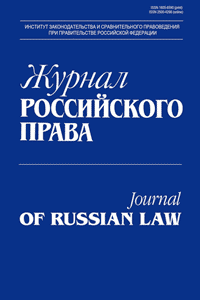The articles dwells upon the issue of differentiation of legal regulation of labor relations which is seen as a legal instrument, which allows taking into account the specificity of social relations that are formed under the conditions of or among the labor law subjects and that have specific features. The differentiation is a polar opposite to the legal regulation unity which embodies the existence of a unified legal status of employees, their equality, and, ultimately, the unity of the branch of law, which is unthinkable without stability and certainty of legal standing of principal participants of relevant legal relations. Further differentiation of legal regulation of labor relations is one of the most typical tendencies in labor law development. The article notes that the grounds for differentiation, out of necessity to coordinate with the principle of equality, and hence abidance by discrimination prohibition, must be entitative, justified and directly linked with an object of legal regulation and satisfy the principles of clarity and unambiguousness. Based on the abovementioned criteria, the authors analyze such grounds of differentiation of legal regulation of labor relations as peculiarities of labor process, its organization, and the type and nature of labor activity, the field of economic activity which uses labor, and the working and environmental employment terms. The articles notes that the grounds for differentiation, chosen by a legislator, do not always correspond to the mentioned criteria. They are often arbitrary and do not reflect their objective need or do not correspond to the reality. For example, inclusion into the Labor Code of peculiarities of legal regulation of labor relations for those categories of workers, in relation to whom these peculiarities have already been established by special laws. In fact these rules do not convey any regulatory meaning and therefore complicate the legislation and do not contribute to clarity and transparency of those workers’ legal status. The analysis shows that the employer’s legal form and the peculiarities of the employees’ professional activities have recently become the mostly widespread grounds for differentiation. The authors draw the conclusion that differentiation cannot be considered valid if it was derived on the basis of one criterion (the employer’s legal form) without taking into account other significant criteria. While the admissibility (and sometimes the necessity) of setting the specificity of legal regulation based on the peculiarities of labor (professional) activity does not raise doubts. The only issue that could be raised is the issue of existence (or absence) of such peculiarities and of the advisability of specific manifestations of the differentiation, i.e. special rules adopted by a legislator.
Differentiation, unity of legal regulation, grounds of differentiation, labor relations, peculiarities of legal regulation, specific categories of employees, equal opportunities, justification of differentiation.
1. Andreev V. S., Goloshchapov S. A., Shebanova A. I. i dr. Sovetskoe trudovoe pravo: uchebnik / pod red. V. S. Andreeva, V. N. Tolkunovoy. 4-e izd. M., 1987.
2. Aranovskiy K. V., Knyazev S. D., Khokhlov E. B. O pravakh cheloveka i sotsial´nykh pravakh. Sravnitel´noe konstitutsionnoe obozrenie. 2012. № 4.
3. Voytinskiy I. S. Trudovoe pravo SSSR. M.; L., 1925.
4. Gerasimova E. S. Osobennosti pravovogo regulirovaniya truda otdel´nykh kategoriy rabotnikov: ucheb. posobie / pod red. Yu. P. Orlovskogo. Dostup iz SPS «Konsul´tantPlyus».
5. Glazyrin V. V. Razvitie regional´noy differentsiatsii v pravovom regulirovanii truda (po materialam severnykh regionov Rossii). Pravovoe regulirovanie truda v usloviyakh perekhoda k rynochnoy ekonomike. Trudy Instituta zakonodatel´stva i sravnitel´nogo
6. pravovedeniya pri Pravitel´stve Rossiyskoy Federatsii. № 60. M., 1995.
7. Gusov K. N., Tolkunova V. N. Trudovoe pravo Rossii: uchebnik. 3-e izd. M., 2001.
8. Ivanov S. A., Livshits R. Z., Orlovskiy Yu. P. Sovetskoe trudovoe pravo: voprosy teorii. M., 1978.
9. Kiselev I. Ya. Sravnitel´noe i mezhdunarodnoe trudovoe pravo: uchebnik. M., 1999.
10. Leviant F. M. Edinstvo i differentsiatsiya sovetskogo trudovogo prava. Vestnik Leningradskogo universiteta. 1958. № 23.
11. Lushnikov A. M. Problemy differentsiatsii v pravovom regulirovanii otnosheniy v sfere truda. Problemy differentsiatsii v pravovom regulirovanii otnosheniy v sfere truda i sotsial´nogo obespecheniya: mater. Pyatoy mezhdunar. nauch.-prakt. konf. / pod red. K. N. Gusova. M., 2009.
12. Lushnikov A. M., Lushnikova M. V. Kurs trudovogo prava: uchebnik: v 2 t. T. 1. 2-e izd. M., 2009.
13. Lyutov N. L. Diskriminatsiya v oblasti truda i zanyatiy: problemy opredeleniya. Trudovoe pravo v Rossii i za rubezhom. 2011. № 4.
14. Nikitinskiy V. I. Voprosy unifikatsii norm sovetskogo trudovogo prava, reguliruyushchikh usloviya truda rabotnikov razlichnykh otrasley narodnogo khozyaystva. Trudovoe pravo v svete resheniy KhKhI s´´ezda KPSS: sb. st. M., 1960.
15. Nurtdinova A. F., Chikanova L. A. Kontseptsiya razvitiya trudovogo zakonodatel´stva. Kontseptsii razvitiya rossiyskogo zakonodatel´stva / pod. red. T. Ya. Khabrievoy, Yu. A. Tikhomirova, Yu. P. Orlovskogo. M., 2004.
16. Orlovskiy Yu. P. Edinstvo i differentsiatsiya sovetskogo trudovogo prava. Ivanov S. A., Livshits R. Z., Orlovskiy Yu. P. Sovetskoe trudovoe pravo: voprosy teorii. M., 1978.
17. Skachkova G. S. Differentsiatsiya v trudovom prave i Trudovoy kodeks RF. Tsivilist. 2012. № 2.
18. Skachkova G. S. Rasshirenie sfery deystviya trudovogo prava i differentsiatsiya ego norm. M., 2003.
19. Sovetskoe pravo: uchebnik / pod red. A. S. Pashkova. M., 1976.
20. Trudovoe pravo Rossii / pod red. A. M. Kurennogo. 2-e izd. M., 2008.








